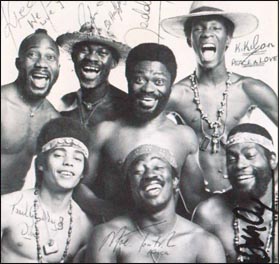| Born: Genre: Style: |
1969 – London, United Kingdom Funk / Soul Funk, Afrobeat |
| Year | Album Title | Label | In House |
|---|---|---|---|
| 1971 | Osibisa | MC Records | On Website |
| 1971 | Woyaya | MC Records | YES |
| 1972 | Heads | MC Records | No |
| 1973 | Happy Children | Warner Bros. Records | YES |
| 1973 | Super Fly TNT (OST) | Buddha Records | YES |
| 1974 | Osibirock | Warner Bros. Records | No |
| 1975 | Welcome Home | Island Records | YES |
| 1976 | Oh yeah Awake | Bronze | No |
| 1977 | Black Magic Night: Live at the Royal Festival Hall | Bronze | No |
| 1980 | Mystic Energy | Bronze | No |
| 1980 | Celebration | Celluloid | No |
| 1981 | Osibisa Like's Live | Mulkti-Sound | No |
| 1983 | Osibisa Unleashed | Magnet | No |
| 1984 | Live at The Marquee | Celluloid | No |
| 1989 | Movements | In-acoustic | No |
| 2020 | Black Magic Night | Trading Places | No |
Founded in London (1969) by three Ghanaian and three Caribbean musicians, Osibisa played a central role in developing an awareness of African music among European and North American audiences in the 1970s.
The Ghanaian founders of Osibisa, Teddy Osei (saxaphone), Sol Amarfio (drums) and Mac Tontah, Teddy's brother (trumpet), were experienced members of the Accra highlife scene (a fusion of African and Western music) before moving to London to perform on the world stage. Osel and Amaflio played in the 'Star Gazers', a top Ghanaian highlife band, before forming 'the Comets', who scored a major West African hit with their 1958 single 'Pete, Pete'.
Tontoh was also a member of 'the Comets', before forming 'Uhuru Dance Band', one of the first bands to bring elements of jazz into Ghanaian highlife. The other founders of Osibisa were Spartacus R (Grenada; bass), Robert Bailey (Trinidad; keyboards), Wendel Richardson (Antigua; guitar) & Lasisi Amao (Nigeria; percussionist & tenor sax).
 Teddy Osei moved to London in 1962, where he eventually won a scholarship from the Ghanaian government to study music. In 1964 he formed 'Cat's Paw', an early blueprint for Osibisa that blended highlife with rock and soul. In 1969, feeling the need to include more acclaimed African musicians in the line-up, he persuaded Tontoh and Amarflo to join him in London and Osibisa was born.
Teddy Osei moved to London in 1962, where he eventually won a scholarship from the Ghanaian government to study music. In 1964 he formed 'Cat's Paw', an early blueprint for Osibisa that blended highlife with rock and soul. In 1969, feeling the need to include more acclaimed African musicians in the line-up, he persuaded Tontoh and Amarflo to join him in London and Osibisa was born.
The band proved to be an instant success, with the single 'Music for Gong Gong' the band had a significant hit in 1971 (three other singles later made the UK Top 10: ' Sunshine Day; ' Dance the Body Music' and ' Coffee Song'). Osibisa's debut album contained 'nmusic' whose rock references were particularly audible in the guitar solos, combined with lively African cross-over rhythms. The true power of the band was only visible on stage with the African village scenarios and a mastery of rhythm and melody.
Woyaya reached number 11 in the UK and Art Garfunkel later covered the song
During the late 1970s they spent much of their time touring the world, playing to large audiences notably in Japan, India, Australia and Africa. They were joined at this time by Ghanaian percussionist Darko Adams 'Potato' (died January 1995, Accro, Ghana).
In 1980 Osibisa performed a special concert at the Zimbabwean indipendence celebrations. By this time, however, Osibisa's star was in decline, in commercial terms, in Europe and America. The band continued touring and releasing records, but to gradually diminishing audiences. Business problems followed.
In 1980 Osibisa gave a special concert to celebrate Zimbabwean independence. By this time, however, Osibisa's star had declined commercially in Europe and America. The band continued to tour and release albums, but audiences steadily declined. Business problems followed.
After initially signing with MCA Records, Osibisa changed labels several times, ending up with Bronz Records.
Their moves reflected their growing frustration with British business, each label in turn trying to convince them to adapt their music to the disco style. Osibisa were prepared to make some concessions but only up to a point.
 In the mid-80s, the group turned their attention to the state of the music business in Ghana, planning a studio and theatre complex, and to help promote young artists from the Highlife scene. In 1984, Tontoh formed a London band to support three visiting Ghanaian musicians—AB Crentsll, Eric Agyeman and Thomas Frempong. An album, 'Highlife Stars', followed on the Osibisa Flying Elephant label.
In the mid-80s, the group turned their attention to the state of the music business in Ghana, planning a studio and theatre complex, and to help promote young artists from the Highlife scene. In 1984, Tontoh formed a London band to support three visiting Ghanaian musicians—AB Crentsll, Eric Agyeman and Thomas Frempong. An album, 'Highlife Stars', followed on the Osibisa Flying Elephant label.
Osibisa performed occasional reunion shows before Teddy Osel put together a new lineup for 1996's Monsore Sequel Records and reissued much of their early catalog in 1999, proving just how good the band was and how incredibly fresh their music still sounds today.
Contrary to popular belief this legendary band is still active and recording. Their latest release 'AKA KAKRA' is an absolute triumph of their familiar rock tinged crossover rhythms mixed with big improvised jazz influences.